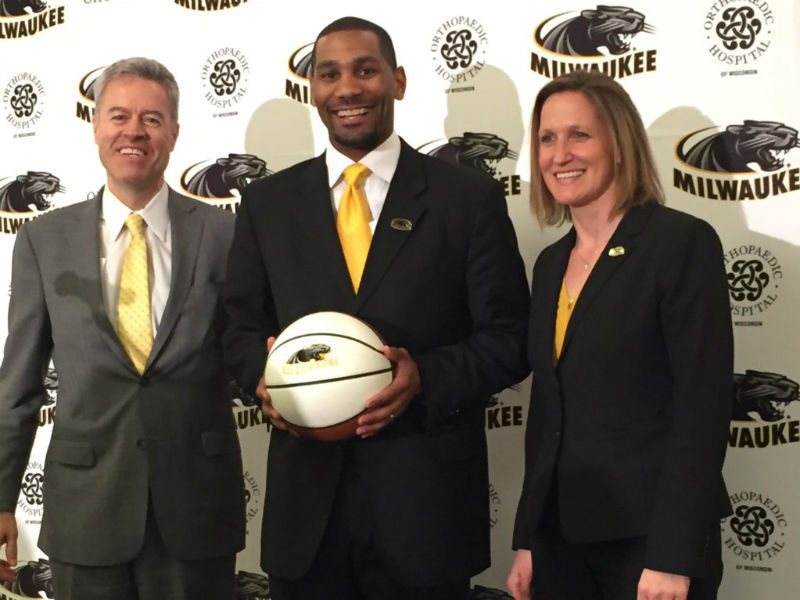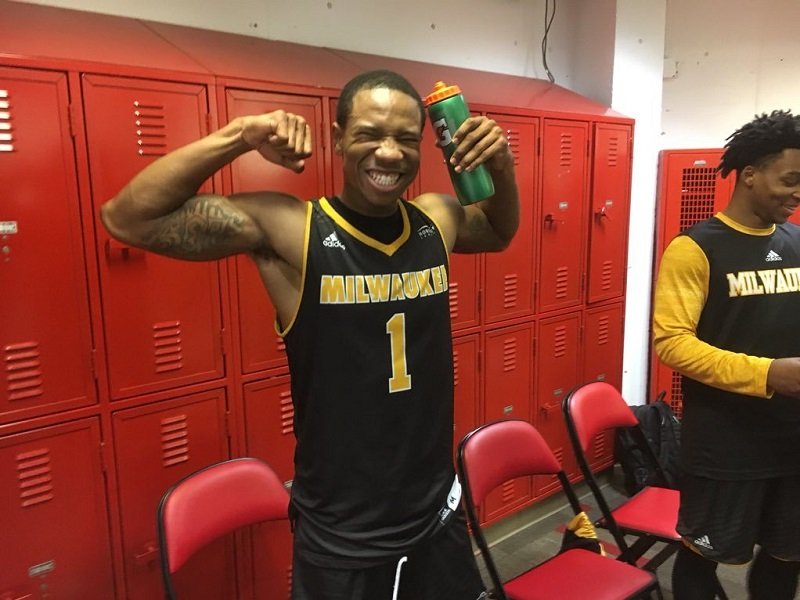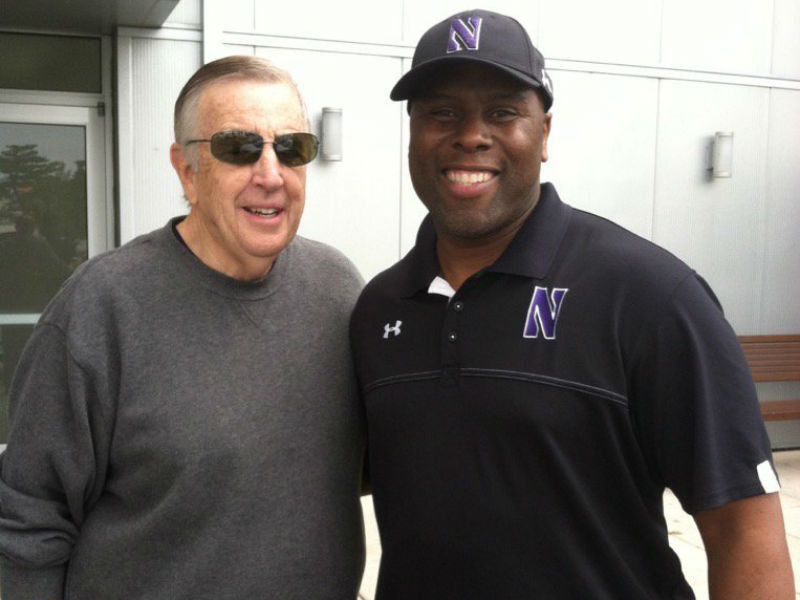LaVall Jordan is excited to be the new head coach of the UW-Milwaukee men’s basketball team. That can be deduced from his 25-minutes press conference on Friday, during which the smiling 36-year-old said 12 times that he was "excited" about the opportunity.
The administration and athletic department are equally enthusiastic about Jordan becoming the Panthers’ next coach. That was clear when Chancellor Mark Mone said he was "absolutely thrilled" to have Jordan, and Athletic Director Amanda Braun, positively beaming, called his hiring "truly a momentous occasion for Milwaukee athletics."
It was indeed a happy affair at the UWM Student Union, as Jordan was officially welcomed to the school and introduced to the media. Other than a couple of benign reporter questions, there was no sign of any adversity within the program or animus toward Braun, who barred the team from the postseason a month ago and fired head coach Rob Jeter and his entire staff on March 17.
Braun said she and Bill Behrns, the senior associate athletics director, with the help of the Parker Executive Search firm and a search committee chaired by David Pate, went through an "extremely thorough" process to identify, interview and select the next coach.
Braun outlined several of the characteristics they'd sought.
"As we considered candidates for this position, we were determined to get the best possible fit and the best possible person for this job. It was our goal to find someone with tremendous integrity and character who does things the right way," she said. "We were looking for a proven winner who holds a track record for developing quality student-athletes, both on and off the court. We wanted someone who has successfully recruited the Midwest, our region. And finally, it was critical that we find someone who was a great fit for our university and for Milwaukee.
There was "tremendous interest in the position," Braun said, but one candidate had risen above the rest. On Wednesday night, UWM officials made the call and the offer to Jordan, whose contract is reportedly worth $350,000 annually, plus incentives.
"The coach we selected is a person of impeccable integrity – that came through loud and clear – not only in the people I talked with, but also in the time that I spent with him. He truly wants to be here in Milwaukee," she said. "We also selected a person who has consistently achieved excellence, both on and off the court, and whose coaching pedigree is second to none."
After taking the podium, briefly donning a Panthers hat for the requisite photo and pulling his notes out of his suit pocket, Jordan jokingly remarked, "That’s the speed we want to attack with, right there."
"I am extremely, extremely excited to be your head coach," he said. "It’s a thrill for me and my family to be here. I am excited to build on the Milwaukee tradition and pursue excellence with this group."
Wearing a dark suit with a white shirt and Panthers gold tie, Jordan first thanked the athletic department at the University of Michigan, where he’d been an assistant the previous six seasons. He then said, "I think it’s important to recognize Coach Jeter and his staff, who’d been here 11 years and put their blood and sweat and tears into helping move Milwaukee basketball forward and advance us to where we are today."
Jordan talked about the experience gained and lessons learned under his mentors, especially then-Butler and now Boston Celtics coach Brad Stevens and Michigan head man John Beilein. "They have molded and shaped the vision, the coach that I am today and had a great impact on me and how I go about handling things the right way," Jordan said.
A former all-conference guard at Butler, where he was later an assistant from 2004-07, Jordan talked about his "great familiarity" with Milwaukee, a fellow Horizon League school and the city in which his mother, Karen Jordan, already lived. He said he was also drawn to UWM because he’d seen the positive support from "the community, the campus, the students" and knew what kind of reciprocal effect a successful basketball team could have back on them.
"It was just an exciting thing for me to think about being a part of, and so it was a no-brainer," Jordan said. "I was in a good seat where I was at the University of Michigan, and it was going to take a great opportunity for me to move from that seat. And this is indeed a great opportunity.
"I believe this about coaching: that it’s about relationships and energy more than strategy."
Jordan said he’d already briefly sat down with many of the current players and was hoping to talk to the rest of them soon. Since Jeter’s firing, four players – Akeem Springs, Jordan Johnson, Austin Arians and Cody Wichmann – requested and were granted their releases from the program, contingent on first meeting with Jordan. The new head coach was asked about the prospect of players transferring.
"I would hope, as we get to know each other – again, relationships are the key to any organization," he said. "And when they committed to Milwaukee, they committed to a vision for the university and to be a part of something special, and that’s what I let them know I’m here to do. I committed to Milwaukee for the same reasons.
"This is their program, these guys. I’m at the head of it, but what they do in those jerseys gets to define our basketball program. I think they’re a connected group – they like each other, they love being around each other, there’s a camaraderie – so I don’t know if I have to convince anyone to be a part of something like this. I will say, I did learn at Michigan that those who stay will be champions, and that’s what we’re gearing towards and my hope is that everyone wants to be a part of it."
Jordan reiterated throughout the press conference that his aim was to learn about UWM and build relationships – not only with the current players and staff, but also with boosters, alumni, students and "the people who made this place as special as it is today, so that we can build on that and make it even more special moving forward."
He indicated that his interactions with Mone, Braun, Behrns and the rest of the administration had been constructive and encouraging. "I just had a really good feeling," Jordan said of the fast-moving hiring process. "I always say you buy the people before you buy the product."
He also takes a relationship-building approach to recruiting, an area in which he’s excelled as an assistant, and evaluates character as much as talent. Jordan said he wasn’t worried about adversity within the program, fallout from the previous regime, problems with the athletic department or, really, anything impairing his ability to recruit.
"If we can get ‘em here, I think it’s an easy decision, once they get here and meet the people," he said. "We’re not going to spend a lot of time looking in the rearview mirror; they make the front windshield bigger for a reason, so we’re moving forward and looking forward. These (current) guys will make other people want to be here, the way they play and conduct themselves and compete."
Asked what sort of style of basketball he planned to play, Jordan said he’d already gotten that question from some of the Panthers players.
"We’re going to be efficient offensively, we’re going to push the pace, play fast and attack," he said. "We’re going to be stingy defensively. Defense and rebounding wins championships; that was the calling card of teams that I played on and teams that I coached, and I believe the best teams in the Horizon League indeed do that. They defend well, they rebound well. And if we do that, then we can run and have some fun.
"I want people, when they leave Panther Arena in downtown Milwaukee, to say, 'man, that was fun to watch’ and come back and they want to see it again."
Jordan, at least at his introduction on Friday, suggested that playing in the downtown arena was indeed an asset, not a drawback, and he approached – but didn’t directly address – speculation that UWM’s basketball facilities put them at a disadvantage, compared to other schools.
"Every place has challenges. What I like to focus on are what are the things that are going to help us compete at the highest level?" Jordan said, noting the Panthers’ "great" support staff. "Every guy I’ve sat down and spoken with has had glowing remarks about our support staff – our strength coach, our trainers, our academic support, they love our personnel and our performance team. And that is huge anywhere.
"I don’t care what the buildings look like. Most courts are the same 94 feet, they’ve got the same 10-foot hoops. There are places that may have more resources, but resources don’t win championships. You’ve got to put in the sweat equity and invest and care deeply, so if we can recruit those types of people into our program, I think it’s going to be great."
Born in Milwaukee but a product of Shorewood High School (go ‘Hounds!) and Northwestern University (go ‘Cats!), Jimmy never knew the schoolboy bliss of cheering for a winning football, basketball or baseball team. So he ditched being a fan in order to cover sports professionally - occasionally objectively, always passionately. He's lived in Chicago, New York and Dallas, but now resides again in his beloved Brew City and is an ardent attacker of the notorious Milwaukee Inferiority Complex.
After interning at print publications like Birds and Blooms (official motto: "America's #1 backyard birding and gardening magazine!"), Sports Illustrated (unofficial motto: "Subscribe and save up to 90% off the cover price!") and The Dallas Morning News (a newspaper!), Jimmy worked for web outlets like CBSSports.com, where he was a Packers beat reporter, and FOX Sports Wisconsin, where he managed digital content. He's a proponent and frequent user of em dashes, parenthetical asides, descriptive appositives and, really, anything that makes his sentences longer and more needlessly complex.
Jimmy appreciates references to late '90s Brewers and Bucks players and is the curator of the unofficial John Jaha Hall of Fame. He also enjoys running, biking and soccer, but isn't too annoying about them. He writes about sports - both mainstream and unconventional - and non-sports, including history, music, food, art and even golf (just kidding!), and welcomes reader suggestions for off-the-beaten-path story ideas.







